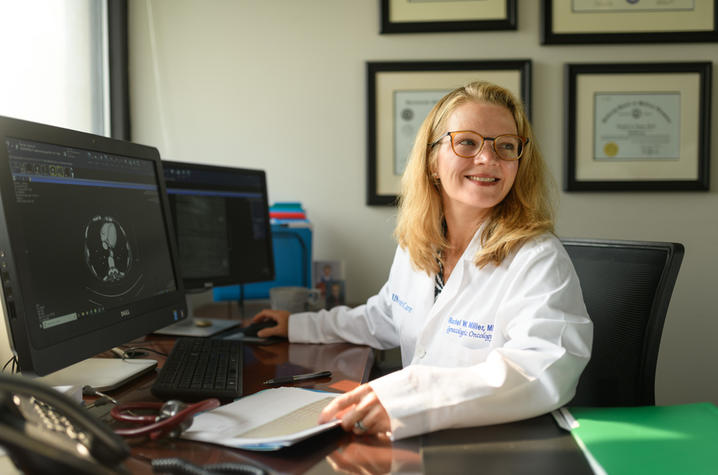Miss USA Elle Smith Talks Cervical Cancer Awareness with UK Markey Cancer Center
LEXINGTON, Ky. (Jan. 31, 2022) – When University of Kentucky College of Communication and Information alum Elle Smith was crowned Miss USA in November, her life changed in an instant.
With her name catapulted into the national spotlight, Smith quickly learned the power of the Miss USA title and platform, and the importance of capitalizing on every open door.
Upon preparing to compete for Miss Kentucky USA, Elle’s coach encouraged her to think about a platform, especially if she had an interest that she was passionate about. She ultimately chose cervical cancer awareness, in honor of her late grandmother, who passed away from the disease in 2015.
“My grandmother was my favorite person in the whole entire world,” Smith said. “She passed away in 2015 from cervical cancer. Before her diagnosis, I had never heard of cervical cancer. I decided that if I was going to be Miss Kentucky USA, I wanted to use that stage to advocate for education and awareness surrounding this disease.”
Smith will work with the National Cervical Cancer Coalition to educate women about cervical cancer prevention and treatment and to empower women to seek preventative care.
As Smith prepares for the year of advocacy ahead, she spoke with experts from the UK Markey Cancer Center in a Behind the Blue podcast about the importance of education and awareness surrounding cervical cancer, including preventative screenings and immunization.
Rachel Ware Miller, M.D., UK Markey Cancer Center gynecologic oncologist, sees many cases of cervical cancer, both early and advanced.
“I see too many cases of cervical cancer,” Miller said. “This is one of those cancers that we can do something about. It is preventable in most cases, and even if we don’t prevent it, we have the capacity to pick it up early with pap smear screening. Cervical cancer is highly curable when you find it early, which drives home the need for awareness regarding the HPV vaccine and regular pap smear screening."
Pamela Hull, Ph.D., associate director of Population Science and Community Impact in the UK Markey Cancer Center and an associate professor of Behavioral Science in the UK College of Medicine, stresses the importance of vaccination and the work she is doing to help physicians across the commonwealth better educate patients about the HPV vaccine.
“Any power we have to protect our kids, we need to use it,” Hull said. “We need to stress better communication, from the doctors to the nurses giving the vaccine to the front desk staff, coordinating whose job it is to give the patient more information so that kids don’t get missed when they’re at the doctor. Kids and their families need to know that there is more than one dose of the HPV vaccine, and they will need to follow up for a second appointment.”
It is estimated that more than 14,000 women in the United States suffer from cervical cancer each year. Kentucky has a higher cervical cancer burden than most states, with an incidence rate of 9.6 cases per 100,000 women.
All women, especially those over the age of 30, are at risk for cervical cancer; however, the disease is highly preventable with screening tests and vaccines that are widely available and effective.
Possible indicators of cervical cancer include abnormal vaginal discharge, odor or irregular bleeding, such as spotting between menstrual cycles or after vaginal intercourse. Any bleeding after menopause should be evaluated. If cervical cancer is identified early, it is very treatable with a high chance of survival. Advanced cervical cancer is more difficult to manage, and the treatment options have significant impacts on quality of life.
In general, women should begin having conversations with their primary care providers at age 21 about the best time to start screening. Pelvic exams are a critical part of optimizing women’s health. Routine pelvic exams are recommended once women become sexually active to identify possible signs of vulvar problems, ovarian cysts, sexually transmitted infections (STIs), uterine fibroids or early-stage cancer.
Most obstetricians and gynecologists recommend screening begin at age 21, with a pap test every three years. A pap smear is only one component of the pelvic exam, and the interval for each may be different. After the age of 30, co-testing for HPV infection can be utilized to extend the screening interval to every five years.
HPV infection is the most important risk factor for cervical cancer. There are more than 100 different types of HPV, but 14 high-risk strains cause the majority of cervical cancers in the United States. Other risk factors that increase the risk for cervical cancer include:
- High number of pregnancy deliveries.
- Using oral contraceptives.
- Cigarette smoking.
- Sexually transmitted infections, such as chlamydia, HIV and herpes simplex virus.
- Sexually active at age 15 or younger.
- Not using condoms.
- Obesity.
- Poor nutrition.
- Immunosuppression.
HPV vaccination has the greatest potential to eliminate cervical cancer risk, and several countries around the world are on track to eliminate cervical cancer from their populations in the next decade. Kentucky has gradually improved its HPV vaccination rate, with now just over half (56%) of eligible girls and boys ages 13-17 vaccinated, but has not yet reached the national goal of 80%.
Routine vaccination is recommended for both girls and boys at ages 11-12 years, with a two-dose series given 6 to 12 months apart if started before age 15 (or a three-dose series if started at older ages). Vaccination is most effective if completed before the age of 26, but it can be given up to age 45 with shared clinical decision-making.
As the state’s flagship, land-grant institution, the University of Kentucky exists to advance the Commonwealth. We do that by preparing the next generation of leaders — placing students at the heart of everything we do — and transforming the lives of Kentuckians through education, research and creative work, service and health care. We pride ourselves on being a catalyst for breakthroughs and a force for healing, a place where ingenuity unfolds. It's all made possible by our people — visionaries, disruptors and pioneers — who make up 200 academic programs, a $476.5 million research and development enterprise and a world-class medical center, all on one campus.






